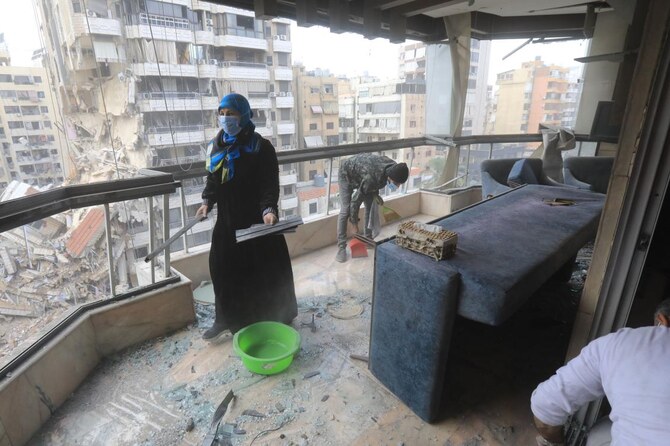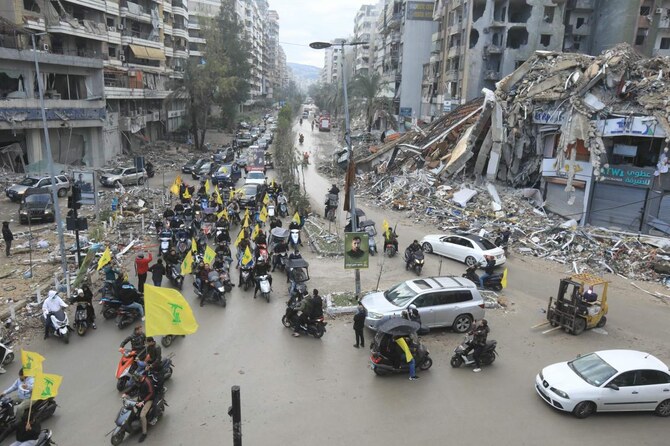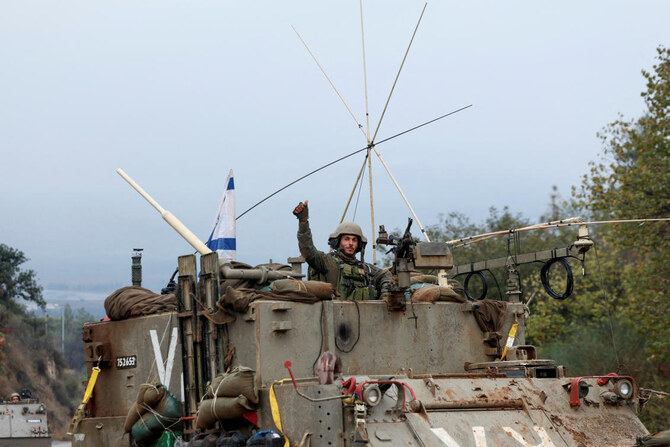BEIRUT: A ceasefire between Israel and Lebanese armed group Hezbollah held on Wednesday after the two sides struck a deal brokered by the US and France, a rare feat of diplomacy in the Middle East wracked by two wars and several proxy conflicts for over a year.
The agreement ended the deadliest confrontation between Israel and the Iran-backed militant group in years but Israel is still fighting its other arch foe the Palestinian militant group Hamas in the Gaza Strip.
Lebanon’s army, tasked with ensuring the ceasefire lasts, said it was preparing to deploy to the south of the country, a region Israel heavily bombarded in its battle against Hezbollah, along with eastern cities and towns and the armed group’s stronghold in the southern suburbs of Beirut.
Cars and vans piled high with mattresses, suitcases and even furniture streamed through the heavily-bombed southern port city of Tyre, heading south. Fighting had escalated drastically over the past two months, forcing hundreds of thousands of Lebanese from their homes.
Israel’s military said on Wednesday its forces were still on Lebanese territory and urged residents of southern Lebanese villages who had been ordered to evacuate in recent months to delay returning home until further notice from the Israeli military. Israeli troops have pushed around 6 km (4 miles) into Lebanon in a series of ground incursions launched in September.
Israel said it identified Hezbollah operatives returning to areas near the border and had opened fire to prevent them from coming closer. There were no immediate signs that the incident would undermine the ceasefire.
The agreement, which promises to end a conflict across the Israeli-Lebanese border that has killed thousands of people since it was ignited by the Gaza war last year, is a major achievement for the US in the waning days of President Joe Biden’s administration.
Diplomatic efforts will now turn to shattered Gaza, where Israel has vowed to destroy Hamas, which led the Oct. 7, 2023, attacks on Israeli communities.
Israel has said its military aim in Lebanon had been to ensure the safe return of about 60,000 Israelis who fled from their communities along the northern border when Hezbollah started firing rockets at them in support of Hamas in Gaza.
In Lebanon, some cars flew national flags, others honked, and one woman could be seen flashing the victory sign with her fingers as people started to return to homes they had fled.
Many of the villages the people were likely returning to have been destroyed.
Hussam Arrout, a father of four said he was itching to return to his home.
“The Israelis haven’t withdrawn in full, they’re still on the edge. So we decided to wait until the army announces that we can go in. Then we’ll turn the cars on immediately and go to the village,” he said.
Announcing the ceasefire, Biden spoke at the White House on Tuesday shortly after Israel’s security cabinet approved the agreement in a 10-1 vote.
“This is designed to be a permanent cessation of hostilities,” Biden said. “What is left of Hezbollah and other terrorist organizations will not be allowed to threaten the security of Israel again.”
Israel will gradually withdraw its forces over 60 days as Lebanon’s army takes control of territory near its border with Israel to ensure that Hezbollah does not rebuild its infrastructure there after a costly war, Biden said.
He said his administration was also pushing for an elusive ceasefire in Gaza.
Hamas official Sami Abu Zuhri told Reuters that the group “appreciates” Lebanon’s right to reach an agreement which protects its people, and hopes for a deal to end the Gaza war.
National security adviser Jake Sullivan said the US would start its renewed push for a Gaza ceasefire on Wednesday.
But without a similar agreement yet in Gaza, many residents said they felt abandoned.
“We hope that all Arab and Western countries, and all people with merciful hearts and consciences...implement a truce here because we are tired,” said displaced Gazan Malak Abu Laila.
Egypt and Qatar, which along with the United States have tried unsuccessfully to mediate a ceasefire in Gaza, welcomed the Lebanon truce. Qatar’s foreign ministry said on Wednesday it hoped it would lead to a similar agreement to end the Gaza war.
Iran, which backs Hezbollah and Hamas as well as the Houthis that have attacked Israel from Yemen, said it also welcomed the ceasefire.
Israel has dealt a series of blows to Hezbollah, notably the assassination of its veteran leader Hassan Nasrallah.
The Israeli military said on Wednesday Israeli forces fired at several vehicles with suspects to prevent them from reaching a no-go zone in Lebanese territory and the suspects moved away.
Defense Minister Israel Katz said he instructed the military to “act firmly and without compromise” should it happen again.
Hezbollah lawmaker Hassan Fadlallah said that the militant Lebanese group would retain the right to defend itself if Israel attacked.
The ceasefire would give the Israeli army an opportunity to rest and replenish supplies, and isolate Hamas, said Prime Minister Benjamin Netanyahu.
“We have pushed them (Hezbollah) decades back. We eliminated Nasrallah, the axis of the axis. We have taken out the organization’s top leadership, we have destroyed most of their rockets and missiles,” he said.
Israel-Hezbollah ceasefire holds in first hours, Lebanese civilians start to return home
https://arab.news/nxvww
Israel-Hezbollah ceasefire holds in first hours, Lebanese civilians start to return home

- Families return to their homes in the most heavily bombed ares of Lebanon
- Lebanon’s army says it was preparing to deploy to the south of the country as part of ceasefire agreement
Syria unable to import wheat or fuel due to US sanctions, trade minister says

- The sanctions were imposed during Assad’s rule, targeting his government and also state institutions such as the central bank
DAMASCUS: Syria is unable to make deals to import fuel, wheat or other key goods due to strict US sanctions and despite many countries, including Gulf Arab states, wanting to do so, Syria’s new trade minister said.
In an interview with Reuters at his office in Damascus, Maher Khalil Al-Hasan said Syria’s new ruling administration had managed to scrape together enough wheat and fuel for a few months but the country faces a “catastrophe” if sanctions are not frozen or lifted soon.
Hasan is a member of the new caretaker government set up by Islamist rebel group Hayat Tahrir Al-Sham after it launched a lightning offensive that toppled autocratic President Bashar Assad on Dec. 8 after 13 years of civil war.
The sanctions were imposed during Assad’s rule, targeting his government and also state institutions such as the central bank.
Russia and Iran, both major backers of the Assad government, previously provided most of Syria’s wheat and oil products but both stopped doing so after the rebels triumphed and Assad fled to Moscow.
The US is set to announce an easing of restrictions on providing humanitarian aid and other basic services such as electricity to Syria while maintaining its strict sanctions regime, people briefed on the matter told Reuters on Monday.
The exact impact of the expected measures remains to be seen.
The decision by the outgoing Biden administration aims to send a signal of goodwill to Syria’s people and its new Islamist rulers, and pave the way for improving basic services and living conditions in the war-ravaged country.
At the same time, US officials see the sanctions as a key point of leverage with a new ruling group that was designated a terrorist entity by Washington several years ago but which, after breaking with Islamist militant group Al Qaeda, has recently signalled a more moderate approach.
Washington wants to see Damascus embark on an inclusive political transition and to cooperate on counterterrorism and other matters.
Hasan told Reuters he was aware of reports that some sanctions may soon be eased or frozen.
Libya military says air strikes target smuggling sites

- The Libyan Army said the air strikes “targeted and destroyed fuel trafficking sites in Zawiya, specifically in Asban,” a semi-rural area outside of the city
ZAWIYAH, Libya: Libya’s UN-recognized authorities have launched air strikes targeting drug trafficking and fuel smuggling hubs west of the capital, a military statement said on Monday.
It remained unclear if there were casualties from the strikes in Zawiya, a city on the Mediterranean coast about 40 kilometers (25 miles) west of the capital Tripoli.
Libya was plunged into chaos after a NATO-backed uprising toppled and killed strongman Muammar Qaddafi in 2011, with armed groups exploiting the situation to fund their activities through fuel smuggling and the trafficking of migrants.
The Libyan Army said the air strikes “targeted and destroyed fuel trafficking sites in Zawiya, specifically in Asban,” a semi-rural area outside of the city.
It also called on locals to clear areas it labelled as “strongholds for trafficking and crime.”
In May 2023, the Tripoli-based government carried out drone strikes as part of an anti-smuggling operation, killing at least two people and injuring several others, authorities said at the time.
Those strikes followed clashes between armed groups suspected of involvement in human trafficking and smuggling of fuel and other contraband goods.
Libya’s eastern-based parliament accused the Tripoli-based Government of National Unity of targeting the home of one of its lawmakers, an opponent of the government.
Libya is divided between the Tripoli-based GNU and a rival administration in the east, backed by military strongman Khalifa Haftar.
Footage posted on the army’s Facebook page showed a military truck smashing into the facade of a small dwelling.
Other footage showed tanks and pickup trucks mounted with machine guns driving through Zawiya.
The city hosts Libya’s second-largest oil refinery, with smugglers trafficking the fuel across the border into neighboring Tunisia.
UN envoy in rare Yemen visit to push for peace

- Grundberg’s office said his visit would also “support the release of the arbitrarily detained UN, NGO, civil society and diplomatic mission personnel”
SANAA: Hans Grundberg, the United Nation’s special envoy for war-torn Yemen, arrived Monday in the rebel-held capital in a bid to breathe life into peace talks, his office said.
Grundberg last visited the capital Sanaa, controlled by the Iran-backed Houthis, in May 2023 for meetings with the rebels’ leaders in an earlier effort to advance a roadmap for peace.
The envoy’s current visit “is part of his ongoing efforts to urge for concrete and essential actions... for advancing the peace process,” Grundberg’s office said in a statement.
Yemen has been at war since 2014, when the Houthis forced the internationally recognized government out of Sanaa. The rebels have also seized population centers in the north.
A UN-brokered ceasefire in April 2022 calmed fighting and in December 2023 the warring parties committed to a peace process.
But tensions have surged during the Israel-Hamas war in Gaza, as the Houthis struck Israeli targets and international shipping in the Red Sea and Gulf of Aden, in a campaign the rebels say is in solidarity with Palestinians.
In response to the Houthi attacks, Israel as well as the United States and Britain have hit Houthi targets in Yemen over the past year. One Israeli raid hit Sanaa’s international airport.
Grundberg’s office said his visit would also “support the release of the arbitrarily detained UN, NGO, civil society and diplomatic mission personnel.”
Dozens of staff from UN and other humanitarian organizations have been detained by the rebels, most of them since June, with the Houthis accusing them of belonging to a “US-Israeli spy network,” a charge the United Nations denies.
US says anti-Daesh operation in Iraq kills coalition soldier

- US officials have said Daesh is hoping to stage a comeback in Syria following the fall in December of Syrian President Bashar Assad
WASHINGTON: The US military said on Monday operations against Daesh in Iraq over the past week led to the death of a non-US coalition soldier and wounded two other non-US personnel.
It also detailed operations in Syria against Daesh militants led by the US-backed Syrian Democratic Forces, including one that resulted in the capture of what the US military’s Central Command said was an Daesh attack cell leader.
US officials have said Daesh is hoping to stage a comeback in Syria following the fall in December of Syrian President Bashar Assad.
West Bank camp under fire as Palestinian forces face off militants

- Gunshots occasionally rung out from inside the camp, an AFP correspondent reported this week
JENIN, Palestinian Territories: A month into a crackdown by Palestinian security forces on militants in the Israeli-occupied West Bank, the streets of Jenin refugee camp are deserted, except for a few residents briefly checking on their homes.
Shops are closed, and militants have erected metal barricades to block Palestinian forces, in the area where Israeli army raids are more common.
Black military vehicles from the Palestinian Authority (PA), which exercises limited control over the West Bank, are stationed beyond roadblocks at the camp’s entrances.
“I only came back to check on my house,” said Muayyad Al-Saadi, a 53-year-old resident of Jenin camp, riding a bicycle down roads stripped of pavement.
Saadi, one of around 17,000 Palestinians who live in the camp, fled when clashes began in early December, citing a lack of electricity and running water.
The fighting, triggered by the arrests of several militants, has involved Palestinian militant factions affiliated with opponents of the PA’s leadership.
One of these factions, the Jenin Battalion, is largely made up of fighters affiliated with Islamic Jihad or Hamas, whose October 7, 2023 attack on Israel triggered war in Gaza.
Hamas, in power in Gaza since 2007, is the main political rival of Palestinian president Mahmud Abbas’s Fatah party, which dominates the PA.
Fourteen Palestinians have been killed, including six security forces, seven civilians, and one gunman in the clashes.
Gunshots occasionally rung out from inside the camp, an AFP correspondent reported this week.
Since bakeries have closed, an unusually long line stretched from a shop that delivers bread from outside the camp.
“I’ve lived through wars since I was eight years old,” said the shopkeeper, Umm Hani, who is in her 70s.
She said there was “never anything like this” since the 1967 Arab-Israeli war, when Israel captured the West Bank.
“Let them (the security forces) come and arrest whoever they want. We have nothing to do with it,” said Umm Hani.
Another woman, in her 30s, said: “Everyone wants to speak out, but they’re afraid of repercussions from both sides.”
“We’re suffering. We can’t leave or enter the camp freely.”
The intra-Palestinian clashes erupted amid a major PA raid on the camp after the December 5 arrest of a Jenin Battalion commander on charges of possessing weapons and illicit funds.
Armed factions in Jenin and elsewhere see themselves as more effective resistance to Israeli occupation than the PA, which coordinates security matters with Israel.
“They (the PA) don’t want any resistance against the occupation,” said a fighter carrying an M16 rifle, blocking a road with militants.
The militants accuse the PA of cutting off the water and power supply to the camp, a claim the Ramallah-based authority denies.
“The gunmen fire at electricity and water crews whenever they attempt to repair the networks,” Anwar Rajab, spokesman for the PA forces, told AFP.
He said militants were also shooting at distributors of food aid.
Rajab added that the PA was trying to spare civilians, accusing militants instead of disrupting the lives of residents.
“We’re not besieging the camp. People are entering and leaving the camp normally.”
One gunman said the fighting has been “incredibly difficult for civilians. They have no water, no food, and they’ve stopped working.”
Walls throughout the camp are riddled with bullet holes, some from past Israeli army incursions and others from the recent fighting.
A 19-year-old Hamas fighter, who requested anonymity, said residents of Jenin camp have been exposed to violence long before the current operation.
“Every house here has a martyr, a prisoner or an injured person,” he said.
The fighter accused the PA’s forces of firing indiscriminately.
Both sides have traded blame for the deaths of the seven civilians, including a father and son killed on a rooftop on Friday.
“If they’re targeting us — the resistance factions and the Jenin Battalion — why don’t they come for us directly instead of targeting civilians?” said the young militant.

























